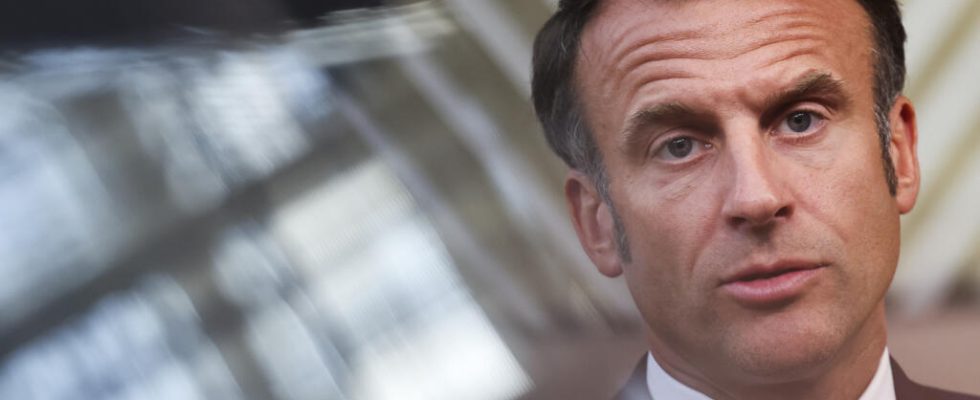Emmanuel Macron must present this Monday, September 25, his “ ecological planning “. After more than a year of consultations, the Prime Minister submitted her copy last week. The French president must therefore make announcements, give a “ cape » for what he has already described as “ challenge of the century » before the presentation to the Council of Ministers of the draft budget for 2024 next Wednesday. And for civil society in France, expectations are high.
4 mins
After several postponements, Emmanuel Macron must present this Monday the main axes of “ecological planning” which he intends to make a marker of his five-year term, despite an environmental assessment considered so far insufficient. “ I am convinced that we have a path which is that of French ecology “, ” an ecology of progress “, ” which is neither denial “, ” nor the cure which consists of saying “it’s going to be a massacre” », pleaded the Head of State on Sunday September 24 during his television interview. He will bring together at 3 p.m. at the Élysée, for the second time, the Ecological Planning Council created after his re-election, with Elisabeth Borne and the ministers concerned.
France is therefore behind on its climate commitments and ecological planning is therefore necessary to catch up in the face of an acceleration in the impacts of climate change. Greenhouse gas emissions are not decreasing fast enough, as Anne Bringault, spokesperson for the Climate Action Network (RAC) which brings together around thirty environmental NGOs. She is therefore awaiting presidential announcements that meet the challenges: “ We have the impression that this is standing still, we have the impression that Emmanuel Macron is refusing obstacles. We are indeed awaiting clarification on the objectives, course, measures, financing and implementation timetable. »
Profound transformations are needed in all sectors, from transport to industry, from agriculture to our way of life. These transformations will have an impact on the way we travel, and also on the insulation of housing, for example. “ It is difficult to initiate this transformation without having someone who shows a vision, who says to the French: “this is where I want to take you” », Estimates Anne Bringault. For the RAC spokesperson, Emmanuel Macron must wet his shirt and defend this ecological planning.
Staying the course in the face of the influence of lobbies
On Sunday, Emmanuel Macron declared that France would exit coal by 2027, by converting its last two power stations, but he did not set a date for exiting oil and fossil gas.
“ We can clearly see that in France a player like Total, whose main activity is the development of fossil fuels, is not going to remain inactive if we have a plan that provides for an exit from fossil fuels. So, it is in the face of these lobbies that we will have to be very powerful. And we really hope that he will reassure us by showing that he really wants to be the leader in the fight against climate change following the Paris Agreement », specifies Anne Bringault.
Sylvain Boucherand, from the Economic, Social and Environmental Committee, also participated in the consultations. He welcomes the effort of the executive, but remains cautious: “ We must be able to follow the progress of the various measures and commitments that are made since, too often, we realize after five or ten years that not much has changed. So ultimately, somewhere, we lost that period. »And to be effective, this ecological planning must involve everyone: local authorities, businesses and every French citizen, according to him.
Supporting the most modest households
Faithful to its line of an ecology “ non-punitive “, the French president also promised to ” support the most modest households » in their own ecological transition, and he multiplied the messages to show that he intended to encourage rather than prohibit. He gave up on banning gas boilers – after having thought about it – so as not to penalize rural areas. The deployment of heat pumps, on the other hand, will be “ accompanied “.
As for vehicles, Emmanuel Macron advocated, here too, a “ accompaniement ” For ” push our households to give up old diesels and old thermal vehicles » to go to “ of the hybrid ” And ” more and more electric “.
The decarbonization of industry
With its agenda for ecological planning, the executive has several projects, including that of the decarbonization of industry. And for companies to abandon fossil fuels, we must accelerate the production of green electricity.
In Dunkirk for example, in the north of France, this electrification of industry has already started. Reducing its CO2 emissions is the objective of the Aluminum Dunkerque company. And for this company, that means green electricity. “ We need about 13.5 megawatt hours of electricity to produce one ton of aluminum. This is the equivalent of the annual consumption of two households. This effectively makes us the largest consumer of electricity in France. », explains Laurent Courtois, energy and climate director.
To decarbonize Dunkirk’s industry, the authorities particularly want to double electricity production by 2035, relying on an energy mix. “ Here, we are lucky to have the largest nuclear power plant in Western Europespecifies Mathias Povse, regional director of EDF. We are the first wind region in France. And soon, the arrival of two EPR2 nuclear reactors. We will therefore supplement to achieve the electricity necessary here for decarbonization. The fact of being at the origin of 21% of CO2 emissions from French industry has meant that this territory has mobilized. It is this territorial collective which turned this constraint into an opportunity. »
If the forecasts come true, the Dunkirk region should achieve carbon neutrality in 2050.
Read alsoEnvironment: humanity is preparing to exceed new “planetary limits”
(And with AFP)
